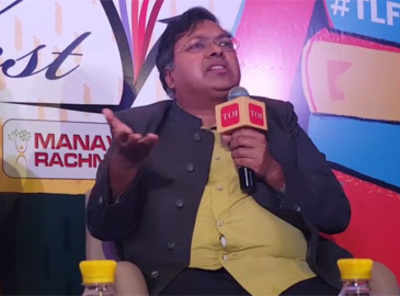- News
- Times Litfest: As long as India denies its feminine traditions, it will never prosper, says Devdutt Pattanaik
This story is from November 26, 2016
Times Litfest: As long as India denies its feminine traditions, it will never prosper, says Devdutt Pattanaik

Devdutt Pattanaik
NEW DELHI: Devdutt Pattanaik, best-selling author of Jaya and Sita, had some very interesting things to say on the tradition of myths and mythology at the Times Litfest in Delhi today.
Pattanaik is known for his quirky retelling of the great Indian mythologies of Mahabharata and Ramayana, in which he incorporates alternate narratives and questions accepted notions about characters, cultures and traditions.
In his address at the Times Litfest, Pattanaik followed a similar vein. On the caste system, he said, "Concept of achut or polluted is a power divide. As per Shiva, he would laugh at the concept as all Prakriti is sacred."
Taking on the gender divide, Pattanaik said, "As long as India denies its feminine traditions, considering we aren't a masculine tradition, it will never prosper."
Pattanaik asserted that myths are a part of our daily lives. "A person saying they don't believe in myths is like a fish saying that it doesn't believe in water," he said. "Myths are a part of a humans daily reality. The idea of one nation state and the constitution comes from Abrahamic Myth," he added.
The writer also talked about the role of imagination in the creation of myths. "Imagination or manas is critical to us and what makes us human. Animals don't have the imagination we humans do," Pattanaik said.
He discussed how myths tend to aggregate and mutate over the ages.
"A myth is like a cabbage with layers of myths. Every generation, new ideas are thrown; some survive, some don't," Pattanaik said.
He also compared Indian mythology to that of foreign countries. He talked about the flood myth and highlighted the "ideological differences" in the way it is portrayed in Hindu, Biblical and Mesopotamian mythology.
"International mythologists write about Indian mythology, but not the other way round. It's time to turn the tables," Pattanaik said.
Pattanaik is known for his quirky retelling of the great Indian mythologies of Mahabharata and Ramayana, in which he incorporates alternate narratives and questions accepted notions about characters, cultures and traditions.
In his address at the Times Litfest, Pattanaik followed a similar vein. On the caste system, he said, "Concept of achut or polluted is a power divide. As per Shiva, he would laugh at the concept as all Prakriti is sacred."
Taking on the gender divide, Pattanaik said, "As long as India denies its feminine traditions, considering we aren't a masculine tradition, it will never prosper."
Citing the example of Ram, Pattanaik described how heroes in Indian mythologies differ from their western counterparts. "Ram is a God, he has no emotional arc like a hero. The concept of hero is not from India but from Greek mythology," he said.
Pattanaik asserted that myths are a part of our daily lives. "A person saying they don't believe in myths is like a fish saying that it doesn't believe in water," he said. "Myths are a part of a humans daily reality. The idea of one nation state and the constitution comes from Abrahamic Myth," he added.
The writer also talked about the role of imagination in the creation of myths. "Imagination or manas is critical to us and what makes us human. Animals don't have the imagination we humans do," Pattanaik said.
He discussed how myths tend to aggregate and mutate over the ages.
"A myth is like a cabbage with layers of myths. Every generation, new ideas are thrown; some survive, some don't," Pattanaik said.
He also compared Indian mythology to that of foreign countries. He talked about the flood myth and highlighted the "ideological differences" in the way it is portrayed in Hindu, Biblical and Mesopotamian mythology.
"International mythologists write about Indian mythology, but not the other way round. It's time to turn the tables," Pattanaik said.
End of Article
FOLLOW US ON SOCIAL MEDIA
